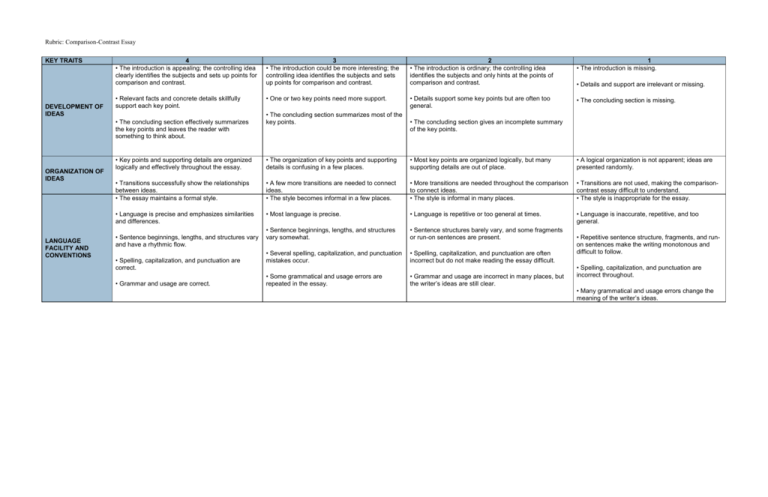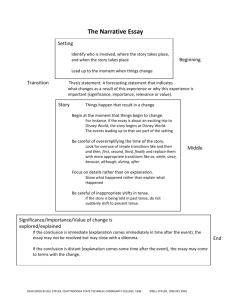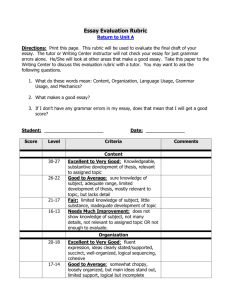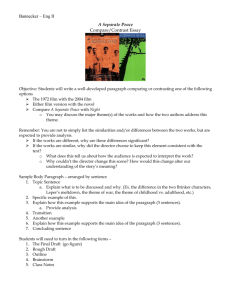rubric compare contrast
advertisement

Rubric: Comparison-Contrast Essay KEY TRAITS DEVELOPMENT OF IDEAS 4 • The introduction is appealing; the controlling idea clearly identifies the subjects and sets up points for comparison and contrast. 3 • The introduction could be more interesting; the controlling idea identifies the subjects and sets up points for comparison and contrast. 2 • The introduction is ordinary; the controlling idea identifies the subjects and only hints at the points of comparison and contrast. 1 • The introduction is missing. • Relevant facts and concrete details skillfully support each key point. • One or two key points need more support. • Details support some key points but are often too general. • The concluding section is missing. • The concluding section effectively summarizes the key points and leaves the reader with something to think about. ORGANIZATION OF IDEAS LANGUAGE FACILITY AND CONVENTIONS • The concluding section summarizes most of the key points. • Details and support are irrelevant or missing. • The concluding section gives an incomplete summary of the key points. • Key points and supporting details are organized logically and effectively throughout the essay. • The organization of key points and supporting details is confusing in a few places. • Most key points are organized logically, but many supporting details are out of place. • A logical organization is not apparent; ideas are presented randomly. • Transitions successfully show the relationships between ideas. • The essay maintains a formal style. • A few more transitions are needed to connect ideas. • The style becomes informal in a few places. • More transitions are needed throughout the comparison to connect ideas. • The style is informal in many places. • Transitions are not used, making the comparisoncontrast essay difficult to understand. • The style is inappropriate for the essay. • Language is precise and emphasizes similarities and differences. • Most language is precise. • Language is repetitive or too general at times. • Language is inaccurate, repetitive, and too general. • Sentence beginnings, lengths, and structures vary somewhat. • Sentence structures barely vary, and some fragments or run-on sentences are present. • Several spelling, capitalization, and punctuation mistakes occur. • Spelling, capitalization, and punctuation are often incorrect but do not make reading the essay difficult. • Sentence beginnings, lengths, and structures vary and have a rhythmic flow. • Spelling, capitalization, and punctuation are correct. • Grammar and usage are correct. • Some grammatical and usage errors are repeated in the essay. • Grammar and usage are incorrect in many places, but the writer’s ideas are still clear. • Repetitive sentence structure, fragments, and runon sentences make the writing monotonous and difficult to follow. • Spelling, capitalization, and punctuation are incorrect throughout. • Many grammatical and usage errors change the meaning of the writer’s ideas.








